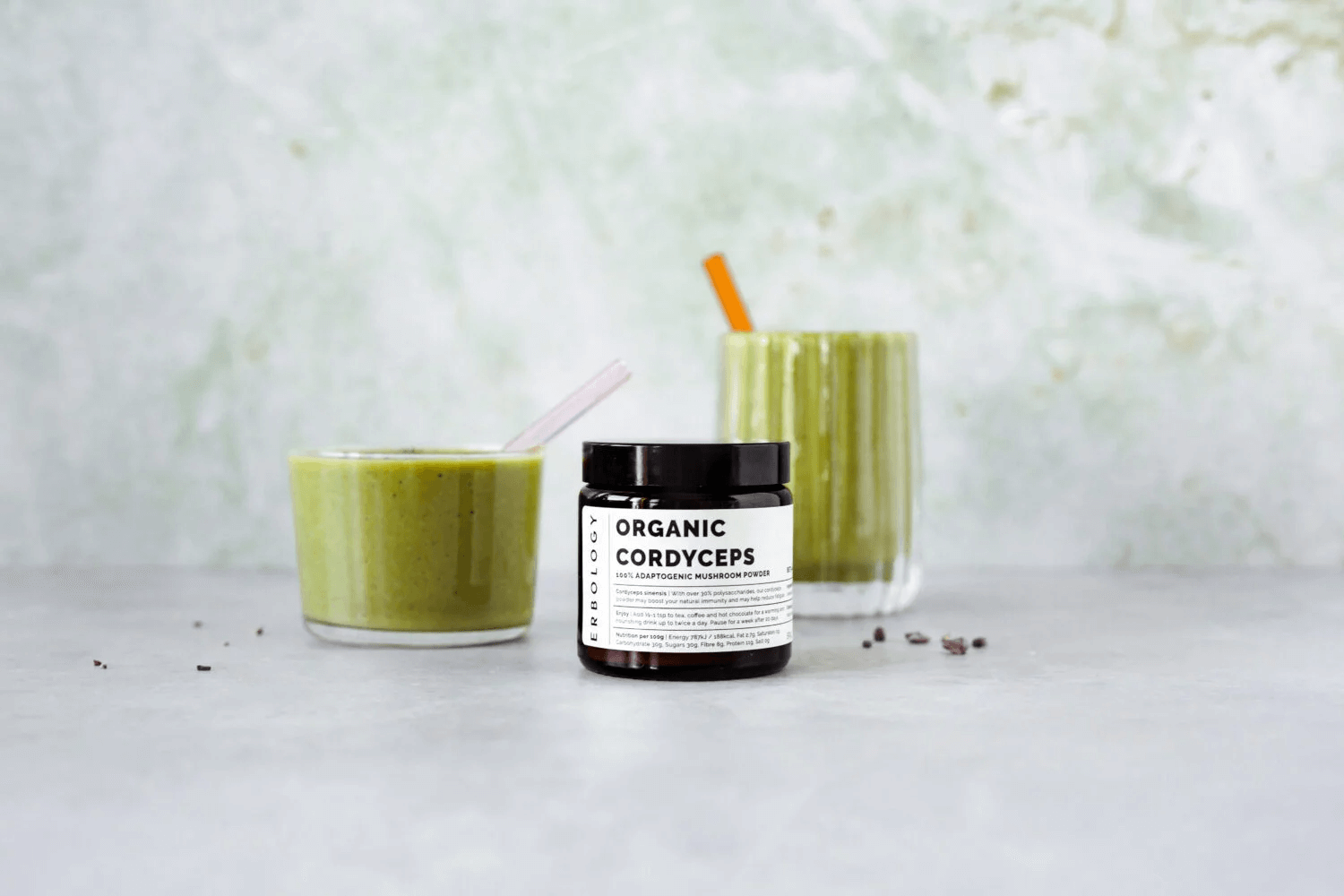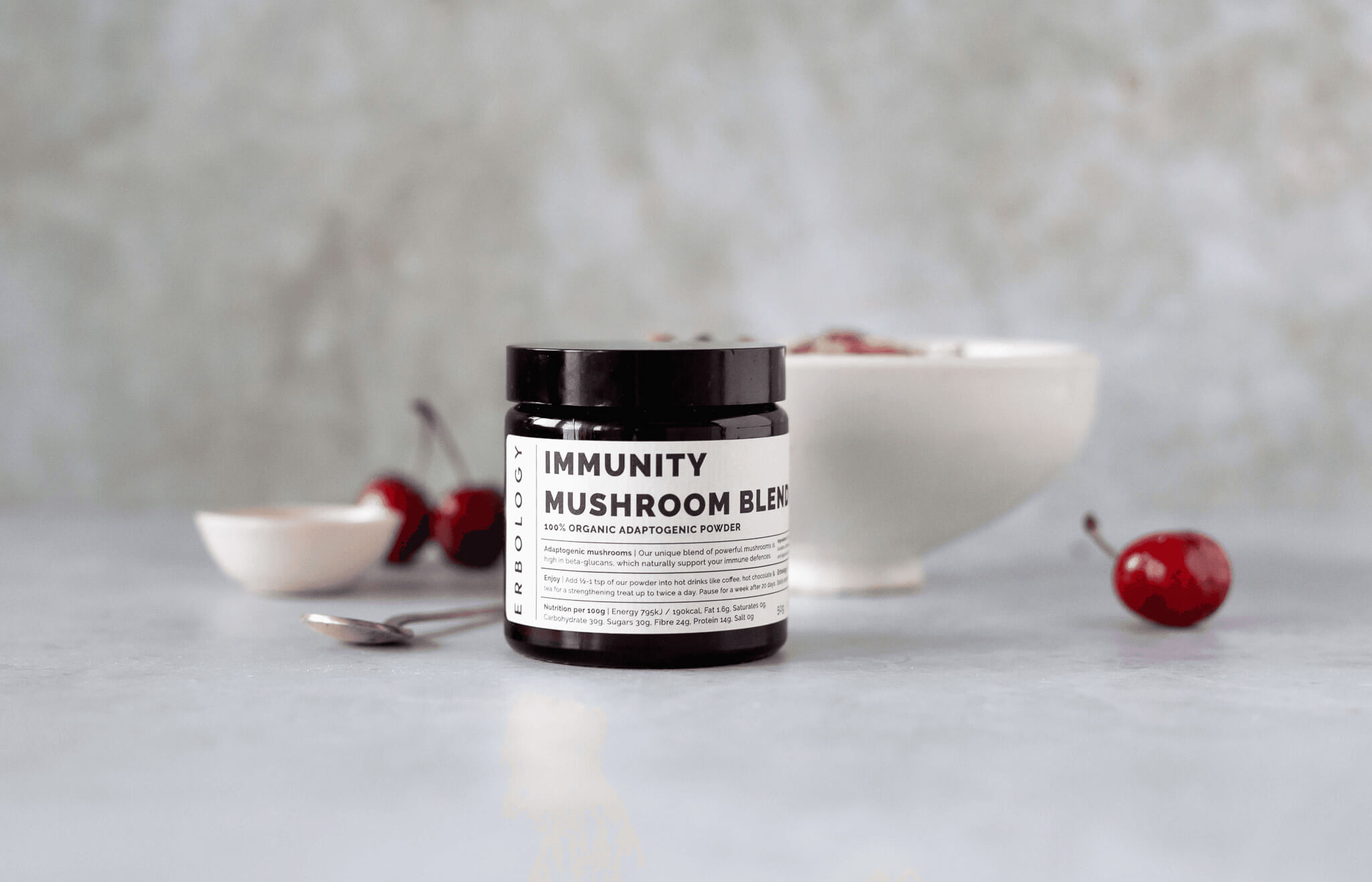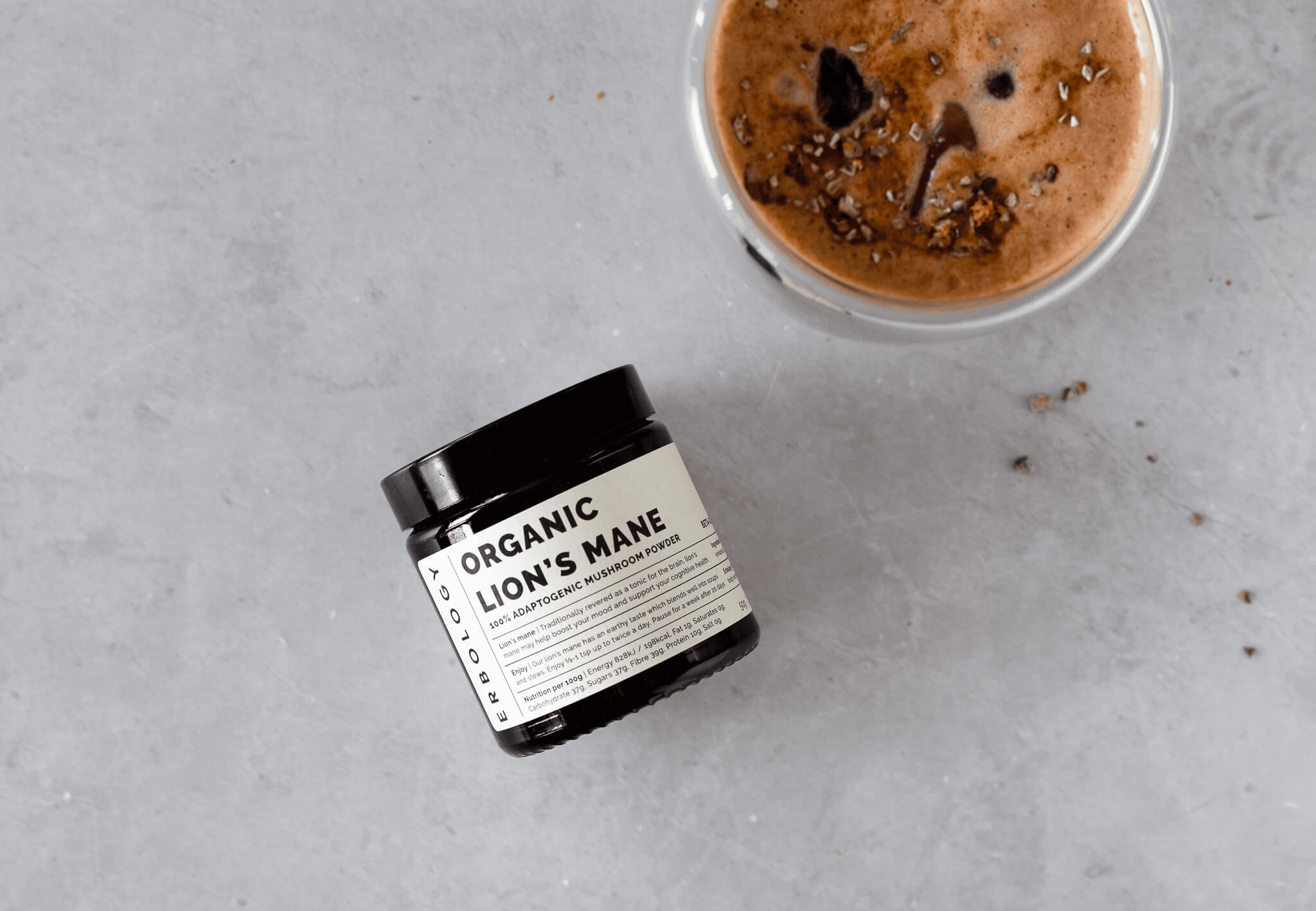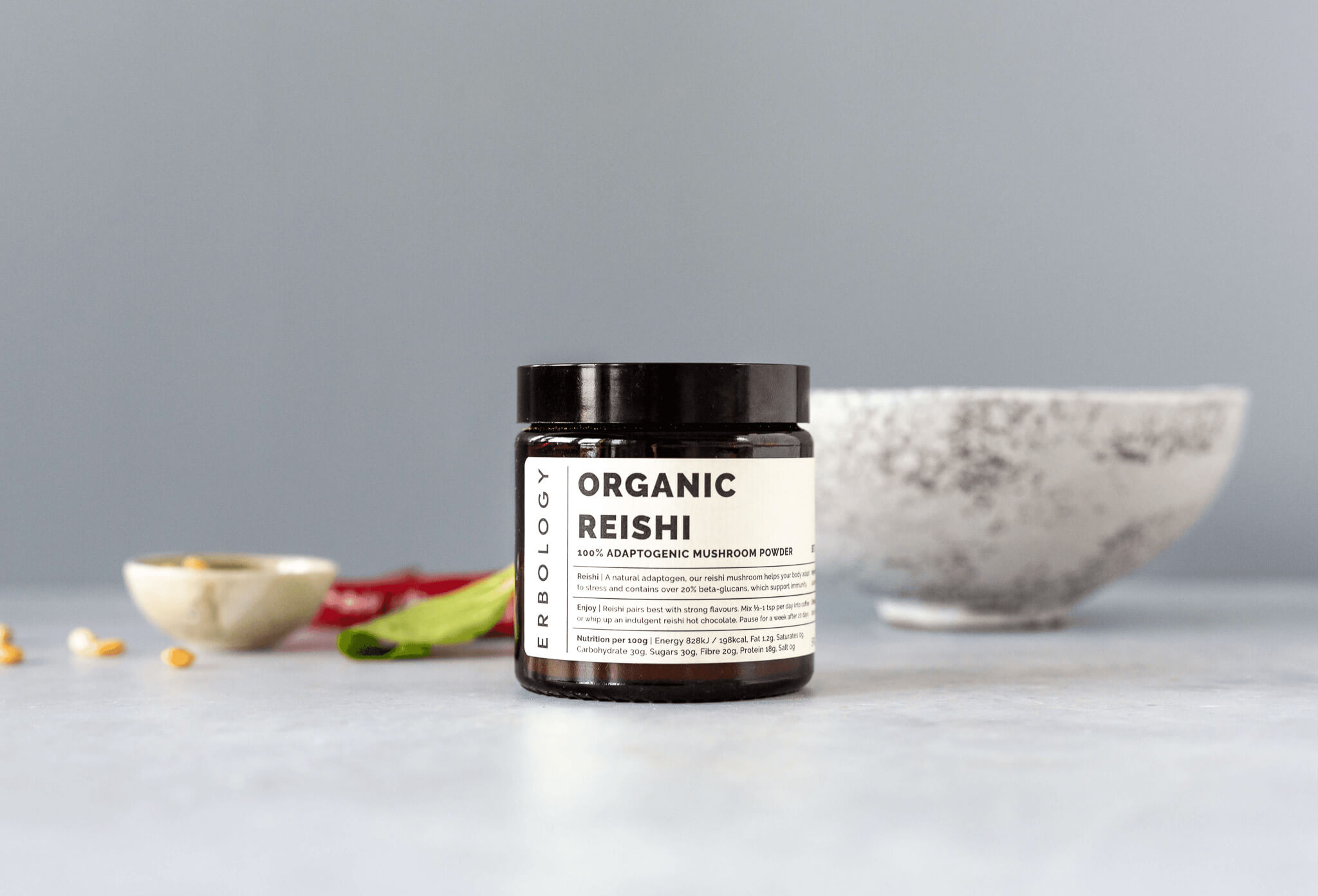14 Dec 2020
Turkey tail benefits for your health
What is turkey tail mushroom?
Turkey tail is a fungus. Jutting out from deadwood or living trees like little shelves, turkey tail mushrooms boast beautiful brown, orange and white bands on their ‘conk’, or upper part. They fan out above the forest floor, looking truly like the tail feathers of a proud bird.
You might also hear turkey tail referred to by its Latin name, Trametes versicolor (formerly Coriolus versicolor).
Any mushroom forager worth their salt will know that turkey tail mushrooms are a relatively common sight in the woodlands of North America, Europe and Asia.
Turkey tails are polypores, which means that they spread their spores through a network of tiny pores (rather than gills, like some other fungi). In fact, the presence of pores on the underside of their conk is a great way to tell them apart from a lookalike fungus called the ‘false turkey tail’.
Turkey tail has a tough, leathery texture. So, many people choose to consume it in a tincture or tea, as opposed to cooking it as you might with a mushroom from the grocer's.
Practitioners of Traditional Chinese Medicine (TCM) have used turkey tail for around 2,000 years to treat various ailments.(1) These include the treatment of ‘dampness’ and ‘phlegm’.(2)
The six pernicious influences
Traditional Chinese medical theory attributes illness to a few different factors. Some are internal, such as the ‘seven emotions’ of joy, anger, anxiety, brooding, sorrow, fear and fright. However, some diseases are caused by external factors.
These factors are known as the ‘six pernicious influences’, and include wind, cold, heat, dryness, dampness, and summer heat.
Each pernicious influence relates quite logically to the disease it represents. Wind, for example, is related to respiratory illnesses such as colds and flu, while heat and dryness are associated with fevers, coughing and irritation.(3)
Dampness, however, is associated with heaviness, stagnation and swelling. This is also where phlegm comes into the picture. Adherents of traditional Chinese medicine believe that phlegm is caused when fluids do not move freely through the body. These fluids accumulate, condense and generally make you feel sluggish.(4)
Thankfully, a prescription of turkey tail mushroom was thought to assist with dampness and phlegm, which gives a hint of its medicinal values.
Today, modern scientific research is gathering empirical data which may help show how turkey tail benefits our health. Let’s take a look at the information available so far.
Turkey tail may help boost your immune system
Given that turkey tail has been traditionally used to treat people who are feeling generally under the weather, it’s not a surprise that it has been linked with boosting immunity. (For a quick recap of how your immune system works, and the different types of cells involved in protecting you from germs, head to our article about staying healthy in winter before reading on.)
Turkey tail naturally contains an active ingredient called polysaccharopeptide, or PSP. It can be found in the mycelium (thready bits) of the fungus, and also in fermentation broths made from turkey tail.
PSP has been approved for clinical use in Japan and China since the 1970s.(1)
A recent review of 41 studies into the immunity-boosting benefits of turkey tail made some impressive conclusions. It found evidence across the different studies to show that PSP enhances immune cell function. PSP also seems to boost the ability of microphages to perform phagocytosis (the process by which microphages engulf or ‘eat’ invading pathogens).(1)
What’s more, it increases the function of cytokines, tiny proteins involved in immune cell signalling, and can improve the unpleasant side-effects of chemotherapy.(1)
As with many natural medicinal plants, we still need more research to fully confirm the effects of turkey tail on the human immune system before we can truly recognise it as an immunity treatment across the world.(1) → See Medicinal Mushroom Products
Related reading
It may promote good gut health
As we know, immunity and gut health go together like peas in a pod. So, it makes sense that turkey tail’s benefits for your immune system may also extend to your digestive system.
As a reminder, each and every one of us plays host to trillions of bacteria which live in our intestines. They exist in a careful balance, with ‘good’ bacteria acting to keep the less helpful ‘bad’ bacteria in check. Together, these bacteria govern the health of our digestive system.
However, your gut is also a handy point of entry into your body for many pathogens. When you eat, you are bringing an enormous number of microorganisms on your food and utensils into your system. Some of these are potentially damaging to your health.
First, these dangerous microorganisms have to survive the hostile environment of your stomach acid. While your stomach is able to kill off many pathogens, some do make it through to your gut. And, as the purpose of the gut is to help you absorb substances from your food, it's all too easy for these pathogens to slip through into your system as well. At least it would be, if the beneficial bacteria living in your gut weren't there to fight them off! → See Medicinal Mushroom Products
Feeding your gut bacteria
These 'good' bacteria need food to keep them alive and functioning. This is just one reason why eating a varied diet full of fruits, vegetables and whole grains - the preferred diet of your ‘good bacteria’ - is so important to your gut health and overall wellbeing.
Gut-friendly foods like turkey tail provide prebiotic fibre. You can’t digest it, but the ‘good’ bacteria in your gut can, leaving them nourished and better able to fight off germs.
A recent study found that turkey tail acted as a prebiotic and helped to regulate the gut microbiome of healthy people.(5)
![]()
undefined

Organic Cordyceps Mushroom Powder

Organic Immunity Mushroom Powder

Organic Lion's Mane Mushroom Powder
